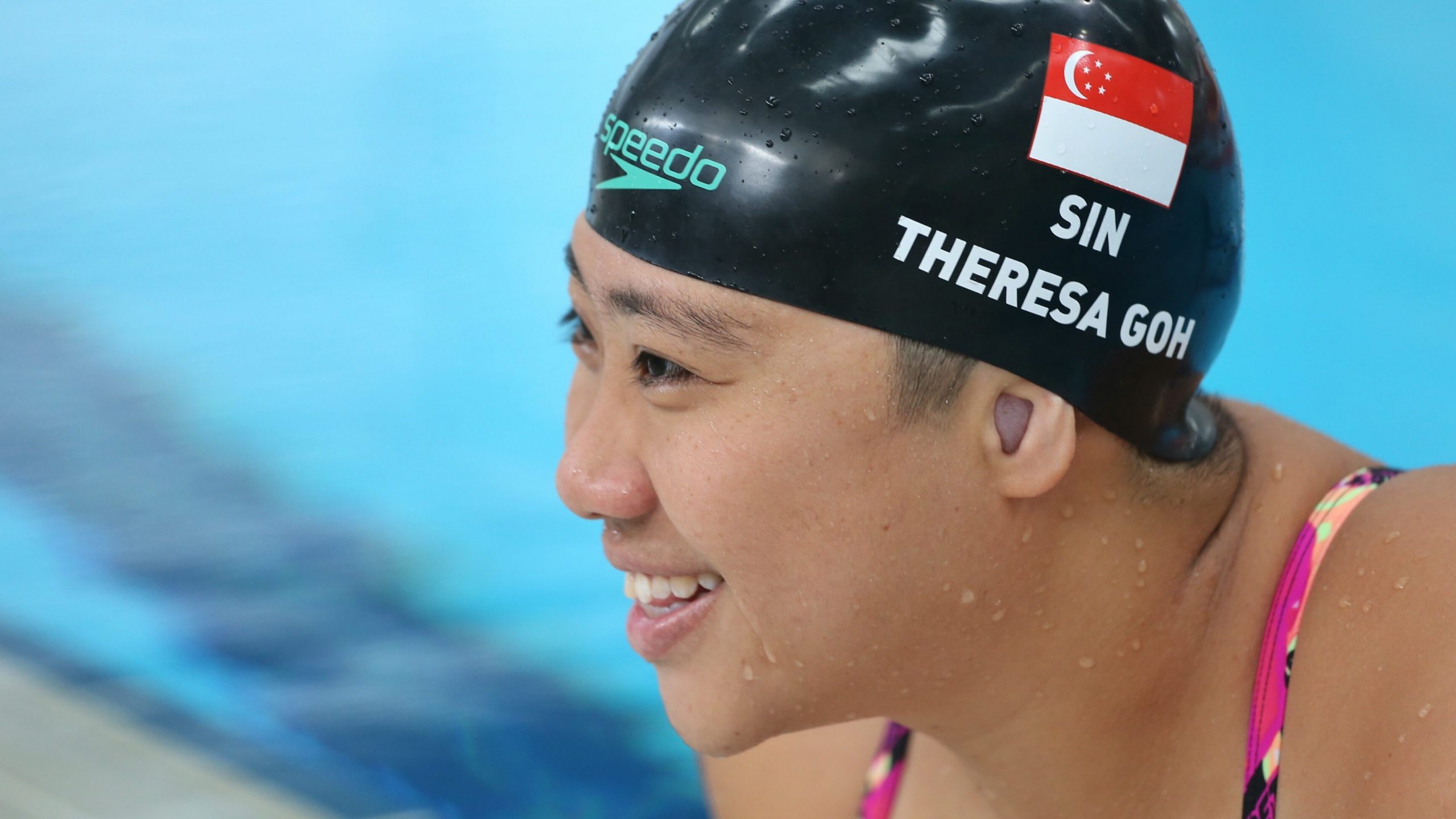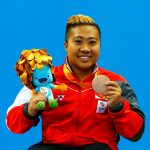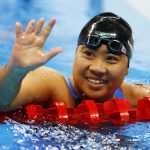‘People with privilege should use it’: Theresa Goh tells Pride House Podcast of need to lift voices for LGBTQ+ rights at Commonwealth Games
A double world record holder and one of Singapore’s most beloved sports stars, Theresa Goh talks about the importance of using your platform on a new episode of The Pride House Podcast; the Paralympic medalist is joined by PH Ambassador Amazin LeThi and activist Numan Afifi for a conversation centred on the Commonwealth’s three South-East Asian nations…

Theresa Goh is Singapore’s first swimming world champion, a two-time Commonwealth Games athlete, and a Paralympic medalist.
But Goh is much more than a para-swimmer – and she wears her “intersectionality of labels” proudly, making her a true stand-out in Singaporean sport.
“After I got my Rio bronze medal in 2016, I started getting a lot more publicity,” she says on episode five of The Pride House Podcast, which focuses on the three Commonwealth countries in South-East Asia.
“But I felt very uncomfortable with the spotlight mainly being on my sporting achievements and maybe my disability. So then I used that opportunity. I thought, ‘OK, now you’ve turned the light on me, I’m going to tell you everything about myself!'”
Goh came out publicly in 2017 in an interview with The Straits Times, Singapore’s most-read English language newspaper. She retired from competitive swimming two years later.

“Since then, I’ve tried to find something that is meaningful. I’ve always wanted my story to be about more than sports so I’ve been really focused on talking about disability awareness, LGBTQ+ rights in Singapore, and just trying to spread my story as much as possible because I feel like I represent a pretty unique set of labels.”
Goh is joined on this podcast episode by Pride House Ambassador Amazin LeThi, whose career in both athlete activism and equality advocacy more widely has taken her around the world; and by Numan Afifi, the Malaysian community organiser who founded the Pelangi campaign and also Jejaka, a group for gay, bi and queer male youth.
All three are encouraging those attending Birmingham 2022 in July and August to speak up for human rights more broadly but also seek out and highlight the specific experiences of LGBTQ+ people living in the Commonwealth countries of Singapore, Malaysia and Brunei.

“We have to have more public discussions around being Asian and LGBTQ+ in sports,” says LeThi. “And it’s not just about Asian athletes in Asia not coming out – we have like less than 10 in the West.
“The Commonwealth Games is a perfect platform. Birmingham is probably the most multicultural city in the UK, with a very high Asian population.”
The most recent attempt to overturn Singapore’s colonial-era anti-gay law Section 377A failed in February 2022 when a challenge by gay rights activists was dismissed by the country’s highest court.
Even though the law was determined to be “unenforceable” and the threat of arrest removed, it was not struck out – and that was hugely disappointing, explains Goh.

“Just the mere existence of the law and the possibility of it being changed in policy does create a lot of uncertainty,” she says.
“The law is a relic of British colonialism and it is really inconsistent with human rights, including non-discrimination, privacy, freedom from arbitrary arrest, and detention.
“I think individuals can still be subject to investigation by police and then if you add on racial profiling and other stereotypes, the issue just becomes bigger and bigger – more than just a mere provision of the penal code.
“It’s not about Asian values at all because countries such as Thailand, Vietnam and Cambodia do not criminalise same-sex relations. So I think if 377A is not enforceable, why do we have it?
“Retaining this law only fuels stigma and marginalisation of the LGBTQ+ community and all this is on top of the existing barriers that we already face on a daily basis.”
Meanwhile, across the border in Malaysia, the situation is far worse, as Afifi describes.

“What we’re seeing right now is the price that LGBTQ+ people have to pay when decades of hate speech is being ignored by the government.
“In 1998, Malaysia was the first Asian country to host the Commonwealth Games. That was around the time when Anwar Ibrahim – the former Deputy Prime Minister, who’s now leader of the opposition – was prosecuted under the sodomy law.
“There’s a lot of hateful rhetoric – the first anti-gay group was established around that time and the government has not done anything to curtail hate speech, even though they say that Malaysia upholds human rights.
“Now, going into the election which is set to happen soon, we’re seeing more hate speech and most of it is perpetrated by politicians themselves.”
Malaysia is sending a team of just under 100 athletes to Birmingham, while Singapore has announced that 67 athletes will travel to compete.
Brunei – which moved to Sharia law in 2019, but which put a moratorium on the death penalty for homosexuality due to international pressure – is yet to win a medal at a Commonwealth Games and is expected to send just a handful of athletes.

It’s in this context that LeThi wants the Games’ anti-discrimination policy to be made abundantly clear to all delegations. In 2018, Commonwealth member states unanimously adopted a consensus statement on promoting human rights through sport.
Ministers vowed to “implement a policy of zero tolerance by sport for violence, harassment, abuse or discrimination, paying particular attention to children and groups in a situation of vulnerability”.
“I think it’s important, considering that so many countries don’t have anti-discrimination laws towards the LGBTQ+ community,” says LeThi. “There needs to be very clear policies. The UK – since it’s hosting – has to lead, and in the Commonwealth, many of these anti-LGBTQ+ laws came from the UK. That’s problematic in itself.”
Afifi is urging allies to address issues around equality and make themselves heard.
“Sports personalities are huge within Malaysia and they need to come out and support – someone has to,” he says.
“It’s not just in sports. There are media personalities who always associate themselves with the LGBTQ+ community in their productions, in their shows, but when it comes to rights, they take a step back.
“So athletes need to show that they are allies so that it will be easier for LGBTQ+ athletes to come out and feel accepted within their field.”

Goh says much of this boils down to recognising your privilege – if you know that you’re in a position of power and that it’s safe to speak up, then it’s time to take on responsibility to make sport and society better for others, particularly the next generation.
“I came out in the national papers in 2017 but let’s not be mistaken, I was never in the closet!
“That’s my point of privilege – I’ve never had to say I’m something I’m not. That helped a lot in the way I navigated sporting spaces and every space I could.
“Being in this position, I feel even more compelled to do everything I can to say something, at least.
“Because that’s something we lack – the people who have such privilege tend to not use it. When we find the opportunity to, and want to, and can, we should.”

Listen now to episode 5 of ‘The Pride House Podcast’ to get the full conversation between Theresa, Amazin and Numan – and head over to the Pride House Birmingham website for more information about the venue, how to register interest in volunteering, and related events.
Missed the first four episodes? Read about them and listen here!
Sports Media LGBT+ is a network, advocacy, and consultancy group that is helping to build a community of LGBTQ+ people and allies in sport. We’re also a digital publisher. Learn more about us here.
We’re interested in your news and stories. Share with us and tap into a worldwide audience through our Google News affiliate website – which pulled in over one million impressions in 2021 – and our popular social channels with over 10,000 followers. Contact us to discuss how we can help you.


